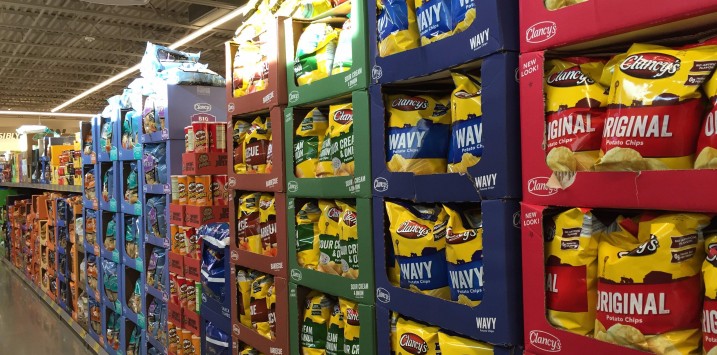
Can Coles and Woolies fight the Aldi onslaught?
So far, Aldi has had a relatively small impact on Coles and Woolworths. But that is set to change as the German retailer continues its expansion strategy. In the longer term, we expect to see their returns on capital decline. If that occurs, it will translate into lower shareholder returns.
It was not so long ago that any conversation involving Coles or Woolworths would prompt a discussion on Aldi’s value proposition. The news flow dimmed somewhat in FY16 but if we look at the underlying data, Aldi’s fundamentals are still improving.
In FY16, the discounter expanded its store network to over 400 stores, began refurbishing old stores, expanded its range and took market share, largely at the expense of IGA (owned by Metcash Limited). However, its impact on the market share of Coles and Woolworths was fairly muted; Coles actually gained market share to circa 26% in fast-moving consumer goods (FMCG) by our count, while Woolworths only slipped marginally (to circa 35%).
This is not to say that Aldi did not impact the majors – it did. They have collectively reduced price premiums to Aldi from circa 20-25% to circa 10-15%. The impact of this was felt on operating profit margins. However, for Coles, this was offset by cost savings and market share gains (operating leverage on top of a large fixed cost base).
The impact on Woolworths was more significant in that it had to reduce its prices more aggressively (to contend with competition from both Aldi and Coles) and has not yet captured additional market share sufficient to offset the lower prices.
Going forward, Aldi seems to be showing no signs of stopping. Its target of circa 500 stores is well within reach. UBS Research performed an analysis of the sector and found room for over 1,000 stores which would increase the geographic spread of competition. Further opportunities exist for Aldi in expansion of the quality and depth of its inventory presenting even more competition.
Can the incumbents fight back? Certainly. Aldi’s ability to operate on a low-cost base stems from its culture and sale of a low number of individual stock-keeping units (SKUs) at a fast rate of turn. Hence, its strength is also its weakness in that unique SKUs can keep customers shopping at Woolworths/Coles (for example, most shoppers would remember Coles’ success with hot chickens).
Retailers in other parts of the world have successfully employed this strategy (for example Lidl in the UK and Wholefoods in the US).
Whilst these strategies can work in the short term, generally increased competition lowers the return firms make on invested capital and these business returns do translate into shareholder returns over the long term. Hence, largely over the long term, we’d expect the same for Coles and Woolworths as competition continues to heat up.
This post was contributed by a representative of Montgomery Investment Management Pty Limited (AFSL No. 354564). The principal purpose of this post is to provide factual information and not provide financial product advice. Additionally, the information provided is not intended to provide any recommendation or opinion about any financial product. Any commentary and statements of opinion however may contain general advice only that is prepared without taking into account your personal objectives, financial circumstances or needs. Because of this, before acting on any of the information provided, you should always consider its appropriateness in light of your personal objectives, financial circumstances and needs and should consider seeking independent advice from a financial advisor if necessary before making any decisions. This post specifically excludes personal advice.
INVEST WITH MONTGOMERY